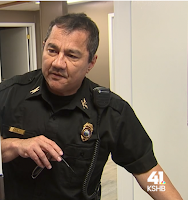 |
| Photo via OSF HealthCare |
"At a time when registered nurses are going on strike to protest staffing shortages, applicants who want to enter or advance in the profession are being turned away from nursing schools," reports Tami Luhby of CNN. "Nearly 78,200 qualified applications were not offered spots at nursing schools last year, according to the American Association of Colleges of Nursing, which represents schools with baccalaureate and advanced degree programs."
Nursing shortages aren't limited to hospitals and clinics; they are also a problem for nursing schools. "The programs are contending with a lack of faculty, clinical placements for students and preceptors who supervise the students during their rotations at health care providers," Luhby explains. "Preceptors also have strict limits on how many students they can oversee, with the ratios often set by state nursing boards." Community colleges that offer associate nursing degrees are bumping up against the same limitations.
As baby boomers age, the need for more nurses will only grow. "There were nearly 3.2 million registered nurses on the job in 2022, according to the Bureau of Labor Statistics. Employment is projected to grow by a faster-than-average 6% between 2022 and 2032, translating into about 193,100 openings annually, on average, over that period, according to the bureau," Luhby reports. "Nursing schools have nearly 2,000 full-time faculty positions to fill, according to the nursing college association."
Salaries for nurses with advanced degrees are a major obstacle to nursing school recruitment and retention. Luhby notes, "The national median salary for nursing school professors with master's degrees is just under $89,000, according to the Nursing College Association. However, the median salary for advanced practice registered nurses with graduate degrees is $120,000, according to the 2022 Nurse Salary Research Report issued by Nurse.com."
In response to the national problem, the Department of Health and Human Services announced that "it will pump an additional $26.5 million into the Nurse Faculty Loan Program, which provides low-interest loans to those studying to be nursing school faculty and the cancellation of up to 85% of loans for those who work as full-time faculty after graduation," Luhby reports. Some nursing schools have forged relationships with nearby health systems to pull their current nurses into advanced degree programs. At the same time, the hospital allows shift flexibility, so an employed nurse continues to work while training to become a teaching faculty member for the nursing college.
























